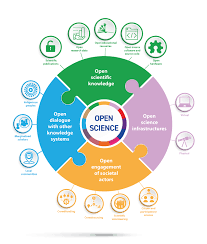The Importance of Science Open Access
Science is a collaborative and ever-evolving field that thrives on the exchange of knowledge and ideas. Over the years, open access has emerged as a powerful movement within the scientific community, enabling researchers to freely access and share scientific literature.
Open access refers to the practice of making scientific research available online to anyone, without any financial or technical barriers. This means that anyone with an internet connection can read, download, and use these research papers for their own studies or to stay informed about the latest advancements in their respective fields.
One of the primary benefits of open access is its ability to democratize knowledge. By removing paywalls and subscription fees, open access allows researchers from all backgrounds and institutions, regardless of their financial resources, to access scholarly articles. This inclusivity fosters collaboration and enables scientists from diverse backgrounds to contribute to scientific progress.
Furthermore, open access promotes innovation by facilitating faster dissemination of research findings. Traditional publishing models often involve lengthy review processes and restricted access periods. In contrast, open access allows for immediate publication and wider distribution of research outputs. This rapid dissemination accelerates the pace at which new discoveries are shared with the scientific community and society at large.
Open access also has societal implications beyond academia. By making scientific knowledge freely available, it enables policymakers, educators, journalists, and the general public to engage with cutting-edge research. This accessibility promotes evidence-based decision-making in various fields such as healthcare, environmental conservation, technology development, and more.
In recent years, many funding agencies and institutions have recognized the importance of open access in advancing scientific progress. They have implemented policies that require researchers to publish their work in open access journals or deposit their manuscripts in openly accessible repositories after a certain embargo period. These initiatives have significantly contributed to the growth of open access and have prompted researchers to embrace this publishing model.
However, challenges still exist. The costs associated with publishing in open access journals, known as article processing charges (APCs), can be a barrier for some researchers, especially those from low-income countries or underfunded institutions. Efforts are being made to address this issue by advocating for funding mechanisms that support open access publishing without placing an undue burden on individual researchers.
In conclusion, science open access is a vital movement that promotes collaboration, innovation, and accessibility in the scientific community. By breaking down barriers to knowledge and ensuring that research outputs are freely available to all, we can collectively accelerate scientific progress and make meaningful contributions to society.
“Understanding the Principles of Open Access in Science”
“Assessing the Cost-Free Nature of Science Open Platforms”
4. “Exploring the Open Access Status of Science
- Should Science be open access?
- What is open access Science?
- Is Science Open free?
- Is Science org open access?
Should Science be open access?
The question of whether science should be open access is a topic of great importance and debate within the scientific community. Many argue that open access is essential for the progress of science, as it allows for the widespread dissemination of research findings, promotes collaboration, and enables researchers from all backgrounds to access scholarly articles. Open access also has broader societal benefits, as it allows policymakers, educators, and the general public to engage with scientific knowledge and make informed decisions. However, challenges such as funding mechanisms for open access publishing still need to be addressed. Overall, the push for science to be open access reflects a growing recognition of the importance of accessibility and inclusivity in advancing scientific knowledge and its impact on society.
What is open access Science?
Open access science refers to the practice of making scientific research freely available online to anyone, without any financial or technical barriers. It is a movement that aims to democratize knowledge by removing paywalls and subscription fees, allowing researchers from all backgrounds and institutions to access scholarly articles. Open access promotes collaboration, innovation, and faster dissemination of research findings, enabling scientists from diverse backgrounds to contribute to scientific progress. It also has broader societal implications by facilitating evidence-based decision-making and engagement with cutting-edge research for policymakers, educators, journalists, and the general public.
Is Science Open free?
Science Open Access refers to the principle of making scientific research freely available to anyone without financial or technical barriers. While the concept of open access promotes free access to scientific literature, it’s important to note that there may still be costs associated with publishing in open access journals. These costs, known as article processing charges (APCs), are often incurred by researchers or their institutions to cover the expenses of peer review, editorial processes, and publication. However, it is worth mentioning that there are also many open access journals and platforms that do not charge APCs, providing an opportunity for researchers to publish their work without any financial burden. Ultimately, the availability of free access to scientific research depends on the specific journal or platform chosen for publication.
Is Science org open access?
Science.org is not an open access platform. Science.org is the website of the journal Science, which is published by the American Association for the Advancement of Science (AAAS). While Science publishes high-quality scientific research, it operates on a subscription-based model, requiring readers to have a subscription or pay-per-view access to view full articles. However, it’s important to note that there are numerous other reputable open access journals and platforms available that provide free and unrestricted access to scientific literature.

No Responses